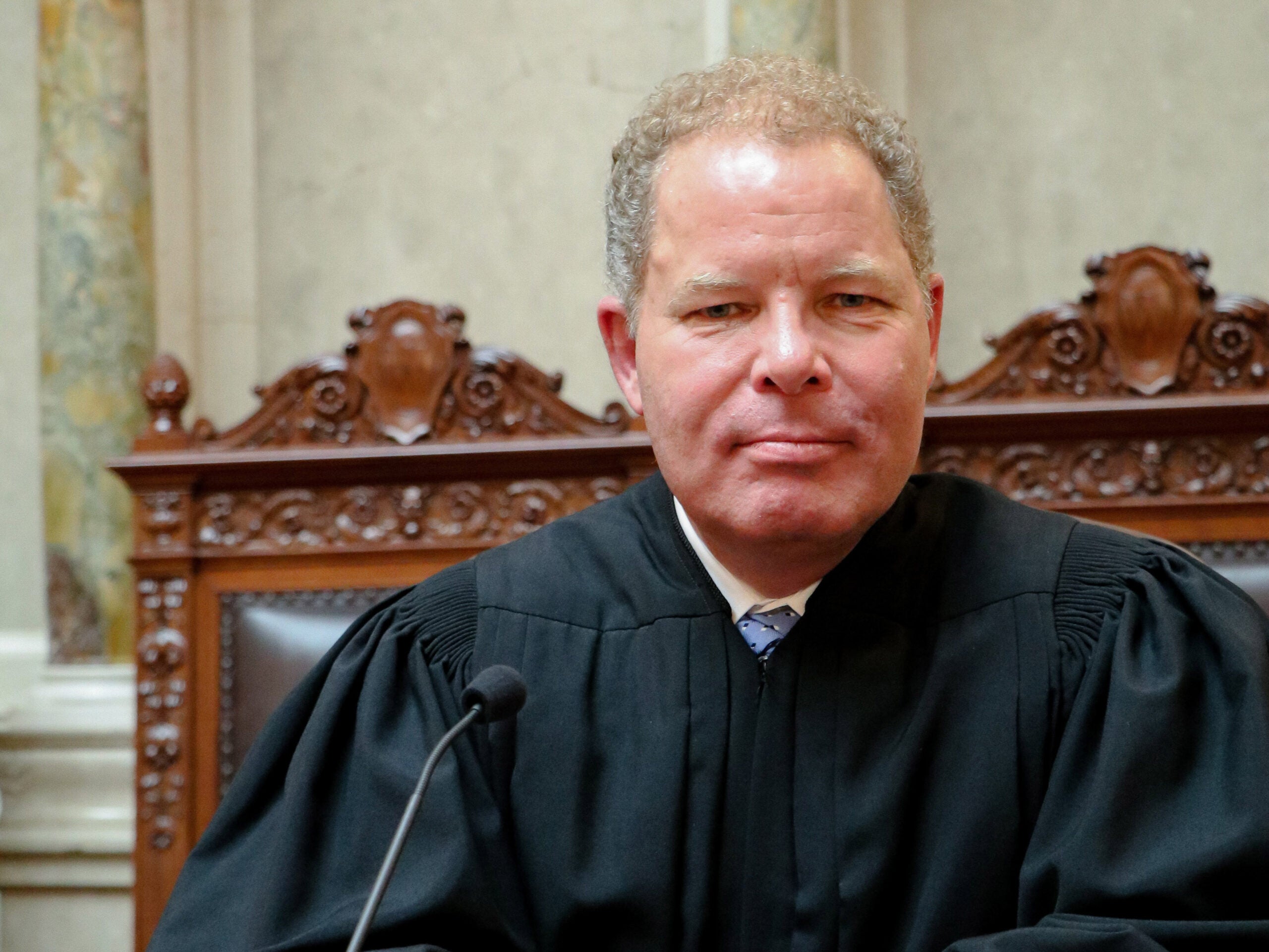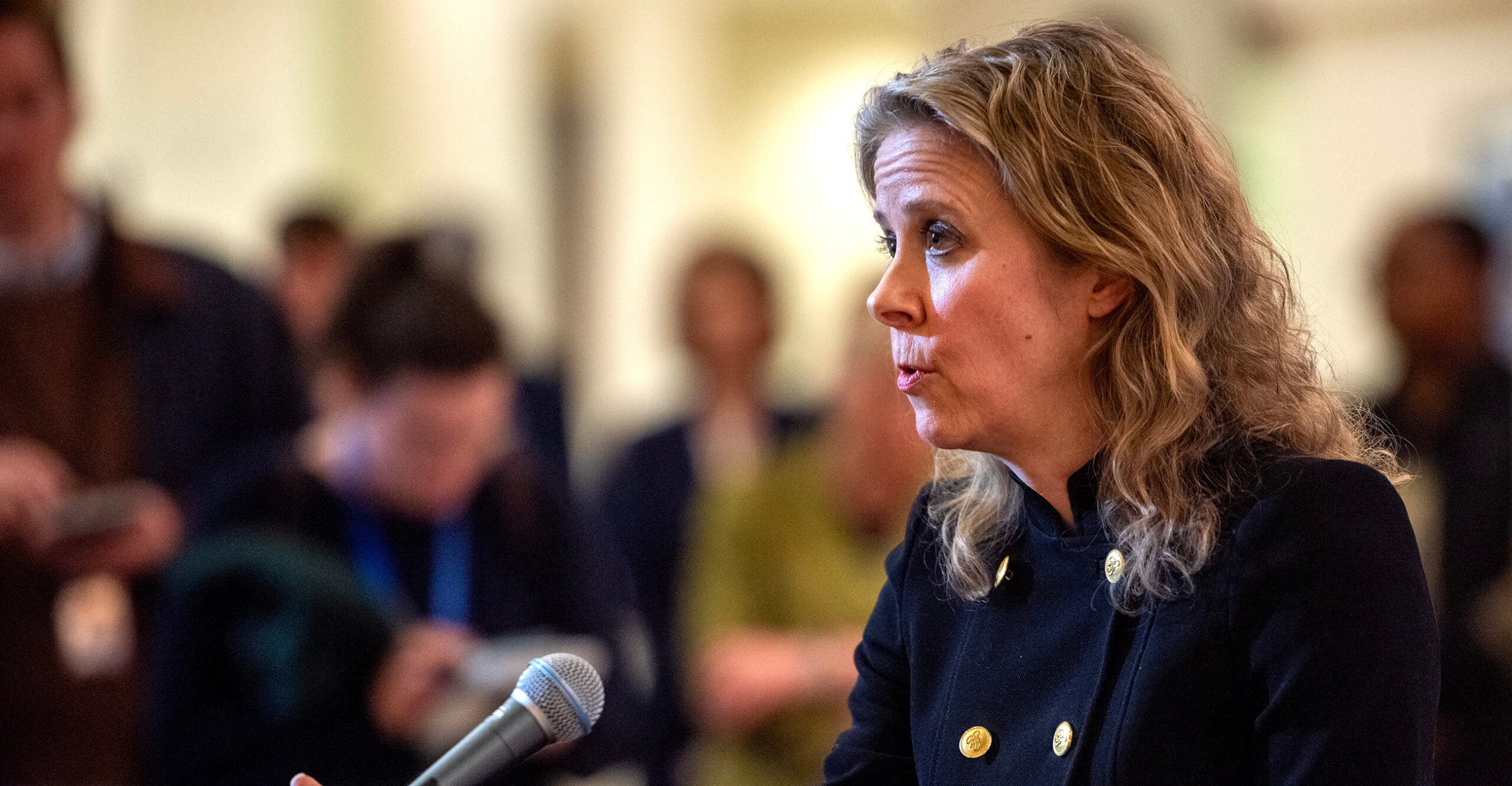In a state Supreme Court election full of ideological undertones, former Justice Daniel Kelly maintains he will keep politics out of his rulings if voters pick him to rejoin the court.
Kelly is one of four candidates running in the Feb. 21 primary as conservative Justice Patience Roggensack is retiring. The top two candidates will advance to an April general election that could tip the ideological balance of the court, where conservatives currently hold a 4-3 majority.
Kelly and Waukesha County Judge Jennifer Dorow are being backed by conservatives. Milwaukee County Judge Janet Protasiewicz and Dane County Judge Everett Mitchell have support from liberals.
News with a little more humanity
WPR’s “Wisconsin Today” newsletter keeps you connected to the state you love without feeling overwhelmed. No paywall. No agenda. No corporate filter.
Wisconsin Public Radio’s “Central Time” recently invited the candidates to discuss their campaigns on the program. Only Dorow declined the invitation.
Republican Gov. Scott Walker appointed Kelly to the high court in 2016. Kelly served until 2020, when he lost an election against liberal-backed Jill Karofsky. On “Central Time,” Kelly’s remarks focused on setting aside politics from rulings.
Read about the interviews with Protasiewicz here and Mitchell here. This interview with Kelly has been edited for clarity and length.
Rob Ferrett: What is your case for being back on the court?
Daniel Kelly: It has to start with my service on the Supreme Court. It was the greatest professional honor of a lifetime to serve the people of Wisconsin as one of their Supreme Court justices. I loved every moment of it. And I especially loved the relationship between the people of Wisconsin and me: That is servant and boss. So, I understood that all the authority that I exercised belonged to them. I was serving them as my bosses during that entire time.
I have written several landmark opinions on constitutional matters, and the body of my work has been quoted, cited or relied upon hundreds of times by courts here in Wisconsin and across the country. As I have traveled the state of Wisconsin, I have listened to what folks have told me. They tell me they want to make sure that the next Supreme Court justice has a long public record of fidelity to the original public meaning of the Constitution.
RF: Voters might treat the court race like a political one. You are saying they should not do that. What do you hope they look at instead?
DK: The court is a nonpolitical branch. All the political questions are to be decided in the Legislature, not the courts. So, the way we do the job — to ensure that we are faithful to the Constitution of the people of Wisconsin — is a methodology that I followed my entire time on the court. You start with the law, whether it’s a constitutional provision, statute, regulation or common law, and then you use rigorous logic to move from that all the way down to the conclusion.
When you’re done, you should be able to look back and see an unbroken chain of logic between the conclusion and the premises of the law. If you do, that is your guarantee that the conclusion is commanded by law and has not been affected by any personal values or politics.
RF: What do you tell people who ask you about redistricting or abortion?
DK: I say the same boring thing that I do every single time. I will decide those cases the same way I’ve decided all cases on the Supreme Court — according to what the law commands. In fact, the other day I was promising people that one of my superpowers is to be boring and that I am running to be the most boring member of the Supreme Court in the state’s entire history, because the role of the court does not change depending on what particular issue it’s addressing. It is always the same. Take the law that already exists and apply that to resolve the case without respect to your personal values or politics. You do that today, and then you do the same thing tomorrow.
RF: Your campaign put out a press release saying you were the only candidate endorsed by all three Wisconsin pro-life groups. Does sharing that with the public signal that voters can expect you to vote one way on an abortion issue?
DK: I don’t think so. If they look carefully at the endorsement (of) those organizations, the conversation I had with them was that they want a justice who follows the law, who is faithful to the original public meaning of the Constitution, faithful to the terms of the statute that people have adopted.
They have not asked me to rule in any particular way on any particular issue. All they want is to be able to address issues in the constitutional manner — to resolve political questions in the Legislature and resolve legal questions in the court.
READ MORE: Wisconsin Supreme Court candidates discuss abortion, redistricting at Madison forum
RF: But people refer to conservative justices and liberal justices. Some decisions appear to play out along those lines. So, justices are not politicians in robes once they join the court?
DK: Well, I’m not. Each individual justice is responsible for answering to the Constitution’s call to be impartial, set aside your personal politics and just do the work of the court. That is what I’ve done. I invite all jurists, whether on the Supreme Court, the Court of Appeals or a circuit court, to do the exact same thing. Don’t allow your personal values or politics (to) influence the work of the court.
If we allow that, that’s where people’s confidence and trust in the judiciary starts to fail. If we allow that to start to fail, people will question whether justice is available in our courts. So, this methodology that I have of careful and precise logic in applying the law to resolve cases is meant to not only be faithful to the Constitution and the people of Wisconsin, but to engender in them confidence that justice can be found in Wisconsin courts.
RF: What do you think are the right standards for state Supreme Court justices to recuse themselves from cases?
DK: Any time there is a circumstance in which a jurist is not completely confident that he can decide the case in front of him without being unduly influenced by a contribution, relationship or any other factor, that person should recuse him or herself.
One of the responsibilities of a jurist is not only to be impartial, in fact, but also to protect that impartiality in appearance. So, when there are circumstances where a reasonable person would not be confident that the jurist is going to decide the case according to the law, that’s something that the jurist should seriously take into account in making a recusal decision.
Wisconsin Public Radio, © Copyright 2025, Board of Regents of the University of Wisconsin System and Wisconsin Educational Communications Board.




